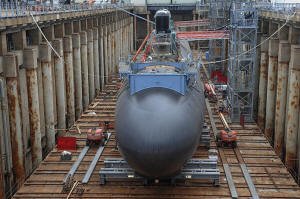Republicans, Democrats alike exhort Trump: Keep security pact with
Australia and UK alive
[August 12, 2025]
By ALBEE ZHANG
WASHINGTON (AP) — U.S. lawmakers from both parties are urging the Trump
administration to maintain a three-way security partnership designed to
supply Australia with nuclear-powered submarines — a plea that comes as
the Pentagon reviews the agreement and considers the questions it has
raised about the American industrial infrastructure's shipbuilding
capabilities.
Two weeks ago, the Defense Department announced it would review AUKUS,
the 4-year-old pact signed by the Biden administration with Australia
and the United Kingdom. The announcement means the Republican
administration is looking closely at a partnership that many believe is
critical to the U.S. strategy to push back China's influence in the
Indo-Pacific. The review is expected to be completed in the fall.
“AUKUS is essential to strengthening deterrence in the Indo-Pacific and
advancing the undersea capabilities that will be central to ensuring
peace and stability," Republican Rep. John Moolenaar of Michigan and
Democratic Rep. Raja Krishnamoorthi of Illinois wrote in a July 22
letter to Defense Secretary Pete Hegseth. Moolenaar chairs the House
panel on China and Krishnamoorthi is its top Democrat.
The review comes as the Trump administration works to rebalance its
global security concerns while struggling with a hollowed-out industrial
base that has hamstrung U.S. capabilities to build enough warships. The
review is being led by Elbridge Colby, the No. 3 Pentagon official, who
has expressed skepticism about the partnership.

“If we can produce the attack submarines in sufficient number and
sufficient speed, then great. But if we can’t, that becomes a very
difficult problem," Colby said during his confirmation hearing in March.
“This is getting back to restoring our defense industrial capacity so
that we don’t have to face these awful choices but rather can be in a
position where we can produce not only for ourselves, but for our
allies."
US cannot build enough ships
As part of the $269 billion AUKUS partnership, the United States will
sell three to five Virginia-class nuclear-powered submarines to
Australia, with the first delivery scheduled as soon as 2032. The U.S.
and the U.K. would help Australia design and build another three to five
attack submarines to form an eight-boat force for Australia.
A March report by the Congressional Research Service warned that the
lack of U.S. shipbuilding capacities, including workforce shortage and
insufficient supply chains, is jeopardizing the much-celebrated
partnership. If the U.S. should sell the vessels to Australia, the U.S.
Navy would have a shortage of attack submarines for two decades, the
report said.
The Navy has been ordering two boats per year in the last decade, but
U.S. shipyards have been only producing 1.2 Virginia-class subs a year
since 2022, the report said.
“The delivery pace is not where it needs to be" to make good on the
first pillar of AUKUS, Admiral Daryl Caudle, nominee for the Chief of
Naval Operations, told the Senate Armed Services Committee last month.
Australia has invested $1 billion in the U.S. submarine industrial base,
with another $1 billion to be paid before the end of this year. It has
agreed to contribute a total of $3 billion to uplift the U.S. submarine
base, and it has sent both industry personnel to train at U.S. shipyards
and naval personnel for submarine training in the United States.

[to top of second column]
|

Shipyard workers at General Dynamics Electric Boat in Groton, Conn.,
prepare a submarine for float-off, July 30, 2015. (AP Photo/Jessica
Hill, File)

"Australia was clear that we would make a proportionate contribution
to the United States industrial base,” an Australian defense
spokesperson said in July. “Australia’s contribution is about
accelerating U.S. production rates and maintenance to enable the
delivery of Australia’s future Virginia-class submarines.”
The three nations have also jointly tested communication
capabilities with underwater autonomous systems, Australia's defense
ministry said on July 23. Per the partnership, the countries will
co-develop other advanced technologies, from undersea to hypersonic
capabilities.
At the recent Aspen Security Forum, Kevin Rudd, the Australian
ambassador to the United States, said his country is committed to
increasing defense spending to support its first nuclear-powered sub
program, which would also provide “massively expensive full
maintenance repair facilities" for the U.S. Indo-Pacific fleet based
in Western Australia.
Rudd expressed confidence that the two governments “will work our
way through this stuff.”
AUKUS called ‘crucial to American deterrence’
Bruce Jones, senior fellow with the Strobe Talbott Center for
Security, Strategy and Technology, told The Associated Press that
the partnership, by positioning subs in Western Australia, is
helping arm the undersea space that is “really crucial to American
deterrence and defense options in the Western Pacific.”
“The right answer is not to be content with the current pace of
submarine building. It’s to increase the pace," Jones said.
Jennifer Parker, who has served more than 20 years with the Royal
Australian Navy and founded Barrier Strategic Advisory, said it
should not be a zero-sum game. “You might sell one submarine to
Australia, so you have one less submarine on paper. But in terms of
the access, you have the theater of choice from operating from
Australia, from being able to maintain your submarines from
Australia," Parker said. “This is not a deal that just benefits
Australia."

Defense policy is one of the few areas where Republican lawmakers
have pushed back against the Trump administration, but their resolve
is being tested with the Pentagon’s review of AUKUS. So far, they
have joined their Democratic colleagues in voicing support for the
partnership.
They said the U.S. submarine industry is rebounding with
congressional appropriations totaling $10 billion since 2018 to
ensure the U.S. will have enough ships to allow for sales to
Australia.
Sen. Tim Kaine, D-Va., told the AP that support for AUKUS is strong
and bipartisan, “certainly on the Armed Services Committee.”
"There is a little bit of mystification about the analysis done at
the Pentagon,” Kaine said, adding that “maybe (what) the analysis
will say is: We believe this is a good thing.”
All contents © copyright 2025 Associated Press. All rights reserved |